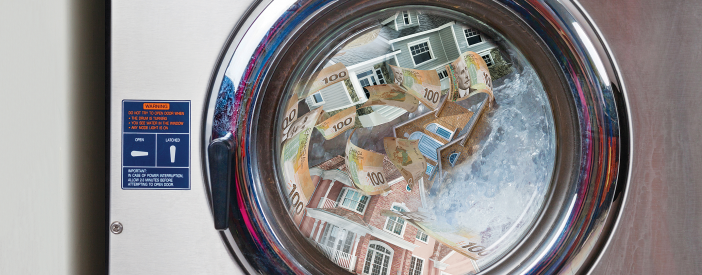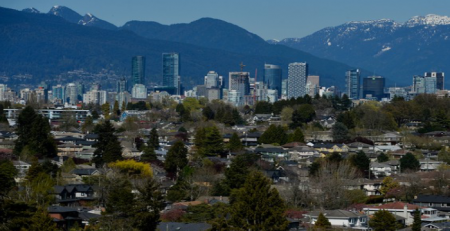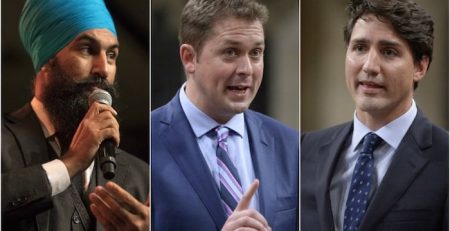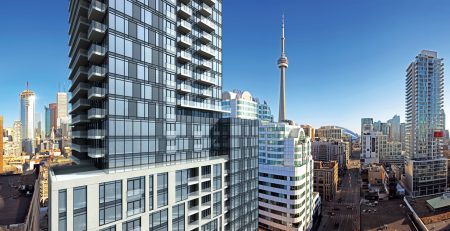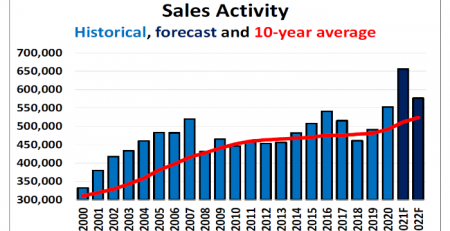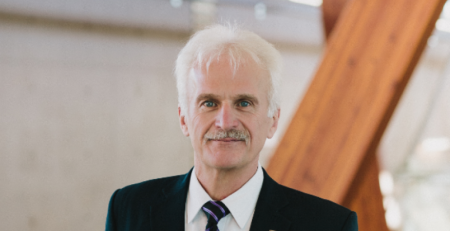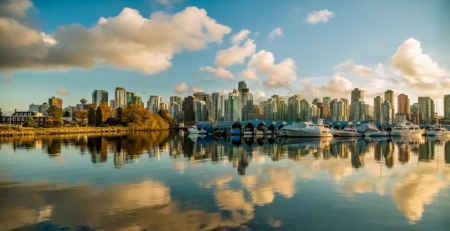Dirty money: it’s a Canadian thing
Canada’s housing markets are rife with shadowy buyers and greasy cash. B.C. was just the beginning.
On paper, Peter Zhang and his wife, Judy Wang, were models for the type of newcomers Canada wanted to attract with its immigrant investor program. Before it was scrapped in 2014, the program’s aim was simple: lure the world’s wealthy to Canada’s shores with the promise of a passport. In return they would bring their business savvy, invest in the economy and create jobs.
Zhang and Wang were undeniably rich. They arrived from China at the end of 2010 with at least $6 million, settling in the suburbs north of Toronto. But almost immediately after, a twisting tale was set in motion that would eventually see Wang accuse a realtor, a lawyer and others of fraud and negligence, and prompt an Ontario judge to raise questions about both the source of Zhang and Wang’s wealth and a string of real estate and mortgage transactions tied to the case.
At the start of 2011, the couple bought their first home, a six-bed, five-bath pile in Richmond Hill, Ont., for $1.25 million—and paid for it entirely in cash. By February, however, Zhang and Wang had separated, claiming in court that they divorced in 2013, though Ontario Superior Court Justice Paul Perell, in a November 2017 decision on a procedural matter in the lawsuit, described the divorce decree as “suspicious.” (In an email through her lawyer, Wang now says they divorced in June 2018.) Regardless, the pair continued to buy and develop three more Richmond Hill and nearby Thornhill properties together, largely in cash, through their joint company Yi Hao Investments. Wang bought a fourth property on her own in Vaughan with a 100 per cent loan-to-value mortgage from RBC in 2017. All told, she and Zhang bought five properties, worth $9.3 million at the time of purchase.
Aside from real estate, a considerable chunk of Zhang and Wang’s wealth was going to cover Zhang’s gambling activities. Over the next several years, Wang testified, she transferred up to $6 million to him from the sale of properties. (Justice Perell noted in his decision that neither Wang nor Zhang had any employment or business interests in Canada beyond real estate investing.) Meanwhile, the couple entered into a series of byzantine mortgage transactions with real estate agent Yan-Ling Ding and lawyer Rahul Kesarwani to generate cash for Zhang’s gambling. For instance, at one point, according to Justice Perell’s findings, Zhang’s ownership of Yi Hao was transferred to Ding to conceal Zhang’s identity so he could obtain a $900,000 mortgage from CIBC, while Kesarwani arranged a high-interest $150,000 private mortgage from his own firm for Zhang. (Ding and Kesarwani were offered the opportunity to comment through their lawyers but didn’t respond, while attempts to reach Zhang were unsuccessful. Through her lawyer, Wang said she was unable to provide contact information for Zhang “at this time.”)
In 2017, Wang sued several people, including Ding for mortgage fraud and Kesarwani for negligence and breach of fiduciary duty. None of the allegations have been proven in court. Justice Perell did, however, offer his findings on the various transactions and testimony in a decision about procedural matters later that year. He didn’t hold back. Ding engaged in a “very suspicious” mortgage transaction, the judge wrote, while Kesarwani’s behaviour was “problematic.” Perell saved his harshest language for Wang and, in particular, Zhang, writing that he found their testimony to be “self-serving, implausible, inconsistent, illogical, incredible, unreliable, evasive and inconsistent with the documentation.”
But Justice Perell also raised questions that are increasingly being asked across the country in other cases: Where did the money come from, and how was it moved to Canada? Wang, on the advice of her lawyer, declined to answer those questions during her testimony. But in his decision, Perell highlighted the sworn testimony of several of the defendants. “[The defendants] believe that Mr. Zhang was a criminal who managed to get his wealth out of China to become a money launderer in Canada,” he wrote. “I make no finding other than saying that it is unknown how Ms. Wang and Mr. Zhang acquired their considerable wealth or how they got it out of China for investments in Canada.”
In her email to Maclean’s, Wang now says she was a part owner of a company involved in reselling steel products, that their money was transferred to a “Schedule I Canadian bank,” though she didn’t say which one. She also said she had “no knowledge of money laundering by Peter Zhang.”
The irony, of course, is that were it not for Wang’s decision to launch the lawsuit, it’s unlikely any of the details contained in this bizarre case—which was referenced in a recent report by Transparency International about the opacity of Toronto’s real estate market—would have ever come to light.
Canadians have learned a lot in the past few months about some of the forces that contributed to the astonishing run-up in real estate prices over the last decade and a half. Many of these revelations have emerged from British Columbia in recent weeks with the release of two landmark reports on money laundering that sought to estimate the scale of the province’s dirty money problem, and detail how it tightened its grip on the housing market and other industries.
The gush of ill-gotten gains into the economy is deeply troubling. An expert panel set up to examine money laundering’s influence on B.C.’s real estate sector “conservatively” estimated in its report that $46.7 billion was laundered in Canada last year. Of that, the panel estimated that transactions in B.C. accounted for $7.4 billion. All that shady money pushed up home prices, too. The panel “cautiously” estimated that property prices are 3.7 to 7.5 per cent higher than they would have been without the effect of money laundering. That’s for the province as a whole. The figure would be higher in markets like Greater Vancouver, where money laundering activity is concentrated.
But the panel also contained unpleasant surprises for other parts of Canada. Using what’s known as the Gravity Model for its estimates—which factors in international trade flows, per capita GDP and crime statistics—it found that Alberta and Ontario have even higher levels of money laundering activity. Maureen Maloney, a Simon Fraser University professor and chair of the panel, acknowledges the limitations of any model to put a dollar figure on a crime that by its nature lurks in the shadows. But this, she says, should be a wake-up call for other provinces. “People like to say this is only a B.C. problem,” says Maloney, “but it’s clear that this is a problem facing all of Canada.”
The B.C. NDP government is not sitting back. The panel made 120 recommendations for ways it and the federal government can crack down on money laundering, and B.C. Attorney General David Eby has already taken action on several of them, including a pledge to establish a public registry of the beneficial owners of all residential property in the province. (Beneficial owners are those individuals who ultimately own the property, even if the title may be in another person’s or corporation’s name.) B.C. Premier John Horgan has launched a public inquiry into money laundering in the province.
The response from provinces like Alberta and Ontario has been less inspired. Alberta Justice Minister Doug Schweitzer largely dismissed the panel’s findings about the scale of money laundering in the province. “We use intelligence from front-line law enforcement agencies, not data we can’t verify,” he told reporters dryly. “We will continue to work with our law enforcement partners to protect law-abiding Albertans.”
The Ontario government insists it already has the issue well in hand. Finance Minister Vic Fedeli’s office said he would not be available for an interview, but released a statement. “We take this topic seriously, and criminal activity will not be tolerated in Ontario,” it read. “Ontario’s police services are well-equipped to investigate and take appropriate steps when illegal activity is identified.”
The undercurrent of denial and complacency in these responses worries experts, who warn the inevitable effect will be a shift in illicit activity away from B.C. to provinces where launderers are less likely to get caught. “As a money launderer, you’re going to go to those jurisdictions where you’ll have less chance of being investigated and less chance of being under scrutiny,” says Maloney.
Kevin Comeau, a retired lawyer and advocate for greater transparency in property ownership, is even more blunt: “While money launderers in B.C. could leave Canada altogether, they’re more likely to head to Ontario, because it has among the weakest anti-money laundering laws of all the Western liberal democracies.”
The signs of suspicious transactions are everywhere in B.C. But Belmont Avenue—west of downtown Vancouver in the upper-class neighbourhood of Point Grey—is as good a place as any to start. The street boasts five of Vancouver’s 10 most expensive properties, and on a sunny day it’s not hard to see why: the houses are located above the Spanish Banks beaches and have unfettered views of the North Shore Mountains.
Save for the clatter of hammers at nearby construction sites, the avenue is eerily quiet and empty for a cloudless afternoon. Many of the homes have curtains drawn across every window. It could be that the inhabitants want to protect their privacy; it’s also possible the homes are vacant. Many on Belmont were named in a 2016 Transparency International report as properties owned through shell companies, or suspect nominees, flagging them as possible money laundering sites. Tian Yu Zhou, listed on land records as a “student,” bought one of the properties, a sprawling cedar-panelled house, for $31.1 million in 2016. Zhou has a 99 per cent ownership stake; his mother, Cuie Feng, listed as a “businesswoman,” owns the other one per cent.
It’s no secret that much of the money flowing into B.C.’s real estate market is coming from China. In one now-famous study, Andy Yan, director of the City Program at Simon Fraser University, examined 174 property transactions over a six-month period in Vancouver’s affluent west side and found that two-thirds of all sales were to buyers with non-anglicized Chinese names, an indicator they were recent immigrants from mainland China.
“Everyone is interested now in how much of that money coming from China is legitimate,” says Christine Duhaime, a financial crime lawyer who has assisted Chinese companies in recovering money stolen from the country that found its way into Vancouver’s real estate market. China has long maintained capital controls that allow its citizens to exchange and withdraw only US$50,000 a year. Other than that, citizens need explicit approval to move their money out of the country.
To show how creative some are getting to circumvent those limits, which have grown more restrictive in recent years, Duhaime points to one case she’s aware of, in which a businessman in China loaded 180 employees onto buses, each carrying a duffle bag stuffed with US$50,000 in cash, and shuttled them to the bank. The employees deposited the money into their accounts and then wired the funds to their boss in Vancouver. The flurry of wire transfers failed to trigger any red flags at the Canadian bank, she says: “For too many years, the banking industry in Canada has taken a position that we don’t ask questions about the providence of money from China.”
Even when money laundering cases do emerge, police in B.C. are woefully short of resources to pursue them. As it stands, there are no federally funded RCMP officers dedicated to investigating money laundering crimes in the province, and prosecutors have a poor track record of bringing such cases to a close. Since 2002, only 10 people have been convicted of money laundering in B.C., according to Henry Tso, a retired RCMP superintendent who now works in fraud mitigation at accounting firm MNP. Often prosecutors opt to drop money laundering charges in cases to focus on charges like drug trafficking that are more likely to result in convictions.
“These cases are more complex to investigate and harder to prosecute than homicide,” says Tso. “At a homicide crime scene you get your DNA and you get your witnesses, but when it comes to money laundering and financial crimes, they cross through international borders, you’ve got complex corporate structures and you need forensic auditing skills to follow very sophisticated paper trails.”
The fight against money laundering in B.C. suffered a major setback late last year when federal prosecutors stayed criminal charges related to the RCMP’s “E-Pirate” investigation. The trial against Silver International Investments, Caixuan Qin and Jian Jun Zhu, which included allegations that $220 million in suspected drug cash was laundered through an underground bank and casino in one year, was to have begun in April. Media later reported the charges were stayed after prosecutors mistakenly exposed a police informant. “That was to be Canada’s largest money laundering case in history,” Eby said recently at a conference focused on Vancouver’s housing market “To have that collapse on the eve of trial was a very significant issue in terms of public confidence in the justice system.”
Provincial prosecutors immediately launched civil forfeiture lawsuits against Qin, Zhu and Silver, alleging money laundering and seeking to recover millions of dollars worth of real estate, casino chips and cash. All three have denied the allegations. A second forfeiture case stemming from the E-Pirate investigation also accuses Stephen Hai Peng Chen of money laundering. He denies the allegations. B.C.’s civil forfeiture office is suing him to seize two homes worth a combined $2.7 million, as well as $60,100 in cash, which, ironically enough, police found stuffed in a clothes dryer.
The same day the money laundering panel released its report in May, another report initiated by the B.C. government was made public. Written by lawyer and former RCMP deputy commissioner Peter German, “Dirty Money – Part 2” was a follow-up to his 2018 report detailing how Vancouver-area casinos “turned a blind eye” for years as criminals treated them as “laundromats” to wash illicit money. His latest report delved deeper into the casino industry, but also detailed how dirty money winds its way through B.C.’s luxury vehicle market and real estate industry.
On the automobile front, German’s team heard from luxury car dealers who said they were “right in the thick of money laundering here,” with large cash-only sales occurring on a monthly basis. In one case, a young car buyer dropped $200,000 cash on a new car and the dealership dispatched a squad of employees to haul the money to the bank, which, after learning that it came from a luxury car sale, gladly accepted the cash.
German says there’s a key difference between money laundering through casinos or luxury cars and through real estate. “You don’t see people carrying bags of cash with real estate,” he says in an interview, noting that with casinos and car dealers the goal is to get dirty money into the legitimate financial system. “With real estate, you’re dealing with money that has already been cleaned.”
The German report identifies several signs of risk for the real estate sector, such as the growth in private mortgage lending, which has thrived in recent years as regulators tightened mortgage rules. In B.C., he found that 90,000 residential mortgages, equal to nine per cent of the market, are held by a mishmash of 18,570 private lenders.
Private lending has also been on the rise in Toronto. A report last year from the Bank of Canada determined that private lenders now account for nine per cent of new mortgages in the city, while the Toronto brokerage Realosophy found 20 per cent of refinancings involved private lenders in 2018, up 67 per cent in two years.
That fits with a quick survey Maclean’s conducted with Ben Rabidoux of North Cove Advisors of high-end properties listed for sale in Toronto, Richmond Hill and Markham, Ont. In the case of 90 of the most expensive houses in those three cities, fully one-third were carrying private mortgages, and of those homes, 20 per cent involved multiple private mortgages. In the case of one Richmond Hill home currently listed for more than $7 million, there were eight private mortgages.
It’s not just that private lenders are not regulated like traditional banks. They don’t have to report suspicious transactions to the Financial Transaction and Reports Analysis Centre of Canada (Fintrac), the watchdog tasked with detecting and preventing money laundering and terrorist financing. “We have a hopscotch system of financial reporting in this country,” says German. Some industries like banking are required to report all transactions over $10,000, while others, like private lenders and lawyers, are exempt.
German says the real estate industry in particular has a deplorable track record when it comes to flagging dubious transactions. From 2014 to 2018, the entire real estate sector in B.C. flagged just 62 suspicious transactions, according to the German report. The numbers in Ontario are hardly better. Over the same period, that province’s real estate industry reported just 112 suspicious transactions, according to figures provided to Maclean’s, even though Ontario has a population three times larger than that of B.C. Fintrac says it has ramped up real estate investigations in the past two years, conducting 362 examinations nationwide, 37 per cent of which took place in Ontario.
Things may soon get better. The last federal budget included additional funding to improve Fintrac’s examinations in the casino and real estate sectors. A Fintrac spokesperson says the agency will also play a role in a new task force that was proposed in the 2019 federal budget; it’s meant to improve coordination between law enforcement and intelligence agencies to fight money laundering.
But for now, says German, police and Fintrac remain apart. “Fintrac has to guess at what the police want, and police have to guess what’s in the databases,” he says.
How bad is Canada at stopping money launderers? “We have a 99.9 per cent failure rate,” says Comeau, the lawyer and activist. He sits on Transparency International’s Canada working group on anti-money laundering and beneficial ownership transparency, and says the most important thing Canada can do to improve its performance is to adopt a national registry of who owns what residential property.
As it stands, Canada makes it incredibly easy for homebuyers, domestic or foreign, to obscure their identities by using numbered companies, offshore trusts and nominee owners to conceal who ultimately owns a house or condominium. That anonymity and opaqueness create a breeding ground for criminal organizations to conceal the flow of proceeds from crime into the housing market. In fact, Comeau believes the B.C. expert panel on money laundering far underestimated the scale of money laundering in Canada at an annual $46.7 billion. He believes the value of the crime is likely closer to $100 billion to $130 billion a year.
B.C. has begun to tackle the problem. In April, Premier Horgan announced the creation of Canada’s first public registry of property owners. All corporations, trusts and nominees will have to disclose their beneficial owners. Those that fail to comply will face fines of up to $100,000 or 15 per cent of the assessed property value, whichever amount is greater. The move will bring the province in line with countries like the United Kingdom, Germany and France that have already established property registries.
In Ontario, realtors are lobbying the province to follow suit. Last month, Tim Hudak, CEO of the Ontario Real Estate Association, said a beneficial ownership registry in Ontario was “well past due,” adding, “Ontario realtors don’t want to see a single dollar of dirty money coming into the housing market. When criminals hide their money here, it drives the price of real estate out of reach for regular Ontarians.”
A recent Transparency International report that examined a decade worth of Toronto real estate transactions found that since 2008, companies acquired $28.4 billion in Toronto-area housing, with most of those being private corporations whose owners were anonymous.
But the B.C. government’s efforts to clamp down on money laundering, not to mention its other measures aimed at cooling the housing market, aren’t going over well with everyone. Speaking to Business in Vancouver, Fraser Institute senior policy analyst Josef Filipowicz warned the moves could hurt the B.C. economy by harming luxury retailers. Fewer big-ticket luxury items sold for cash could lead to slower sales, his argument went, forcing retailers to cut back on staff.
Eby, B.C.’s attorney general, took to Twitter to skewer the idea that money launderers need protecting in order to save jobs. “How about ‘Bullet sales decline could impact gun store jobs if government successfully cracks down on gangs,’ followed by ‘Cancer doctors fear for careers with crackdown on tobacco.’ ”
Joking aside, the animosity toward the government’s recent measures is becoming palpable—at least among certain demographic groups with a history of high voter turnout. Lawyer Jonathan Rubenstein, 70, is director of StepUP, an organization of 2,000 mostly silver-haired members that formed to oppose the NDP’s housing measures. He says the group is for “people who understood that in a society the creation of wealth is very important and that protecting the minorities in that society is very important and not being unduly unfair to these sections of society is very important.” He insists that cracking down on money laundering, which could potentially remove Chinese buyers from the market, is unwarranted, since the numbers being bandied about are theoretical: “We don’t know how much dirty money is in the houses.”
On the other side of the demographic spectrum are young Vancouverites shut out of home-buying by soaring prices, who welcome any measures that remove froth from the market. “For a lot of people my age in the city, owning a home is just not a feasible thing,” says Trevor Clarke, a 28-year-old public relations professional. During the run-up in prices, it was clear to everyone that there was a lot of money coming into the city, he says, “but the justification was always—well, Vancouver is a really desirable place, so who are we to say that the money coming in is dirty?
“But it gets to a point where people are just sitting on their homes and using them as investments,” he adds. “My opinion of that has really changed; housing is less of a commodity and more of a basic need that a city should govern and legislate for citizens.”
As B.C. tackles its money laundering crisis, and other provinces look on, those involved in the fight don’t expect any easy victories. “It’s like Medusa’s head,” says Duhaime. “You cut off one and suddenly realize there are 10 other snake heads you need to deal with.”

